
|
| Name: _________________________ | Period: ___________________ |
This test consists of 15 multiple choice questions and 5 short answer questions.
Multiple Choice Questions
1. In "An Erratic Flight," what is the literal reason that the travelers get rid of some of their possessions?
(a) They need to lighten the load the wagon is carrying.
(b) They need room in the wagon for more water.
(c) All of them are trying to leave their past behind.
(d) Some of their clothing and blankets are contaminated.
2. In "Most Were Naked and Beautiful," what do the Indians use to draw on their skin?
(a) Pollen.
(b) Ground bark.
(c) Powdered bones.
(d) Blood.
3. In "As If the Milky Way Began or Ended Right There in Her Hands," how does China Iron react to Liz's story about her final conversation with the Colonel?
(a) She realizes that Liz was only pretending to like the Colonel's ideas the whole time at the fort.
(b) She feels like Liz is being distant and acting like they have never been intimate.
(c) She wonders if she really knows Liz as well as she thinks she does.
(d) She thinks that Liz might have been happier to stay at the fort and is afraid for their future.
4. In "Most Were Naked and Beautiful," why do the travelers not know where to stop their wagon?
(a) The ground seems too muddy to stop on without getting stuck.
(b) They cannot identify a tent that seems to belong to a leader.
(c) Different Indians gesture to them to stop in different places.
(d) They are not sure if they will be attacked for stopping too near the encampment.
5. In "Punch and Whisky," why does Liz use lemons and oranges to make her punch?
(a) They will hide how much alcohol she is adding.
(b) There is no other fruit at the estancia.
(c) They are Hernández's favorites.
(d) They are specifically mentioned in "El Gaucho Martín Fierro."
6. With whom did Martín live when he first came to the Indian encampment?
(a) Oscar.
(b) His children.
(c) Cruz.
(d) Kauka.
7. What is Liz's belief about the savage punishments they see happening in In "The Whip and the Rod"?
(a) They are necessary so that people learn their place in the world.
(b) They are sad but it is the only way to preserve discipline in a dangerous territory.
(c) They are not a Christian practice.
(d) They are appalling and further evidence of Argentine savagery.
8. What is the result of all of the drinking at the party in In "Punch and Whisky"?
(a) Rosario's cattle escape.
(b) China Iron realizes that Liz does not have her best interests at heart.
(c) Nearly 200 men desert the fort.
(d) Everyone ends up having sex.
9. In "But We Don't Have Any Weapons," what is different about the area where the community decides to relocate?
(a) It is much flatter.
(b) It is dominated by sand dunes.
(c) It is dominated by water.
(d) It is much colder.
10. In In "The Whip and the Rod," on page 116, when China Iron asks Liz why she is being so domineering, what does Liz reply?
(a) "But you like it, don't you?"
(b) "Mind how you go, little girl frog."
(c) "Women are like horses."
(d) "This is how you learn."
11. In "That Strange Gaucho Who Fancied Himself as a Writer," what reason does the Colonel give for allowing Martín to sing to the workers?
(a) Martín's semi-literate verses amused him because they were so rough and crude.
(b) Martín was not useful for other kinds of work.
(c) He wanted to hear the songs so that he could turn them into poems and sell them.
(d) Keeping the gauchos happy is important because they outnumber the soldiers.
12. In "As If the Milky Way Began or Ended Right There in Her Hands," why does China Iron look forward to the rain?
(a) Because it will make the pampas bloom with wildflowers.
(b) Because she can be alone with Liz in the wagon.
(c) Because they are nearly out of drinking water.
(d) Because she loves the science of the lightening rod.
13. In "Contemplating the Trees," how often does China Iron say people in her community need to work?
(a) Everyone has to work hard every day.
(b) They work one month and then have two months off.
(c) They work hard in the spring through the fall, and take the winter off.
(d) They work five days a week and then take two days off.
14. In "Light is Doubled on the Islands," what excuse does Liz give when she goes into town to buy nets?
(a) They are for protecting fruit crops from birds.
(b) They are for wedding dresses.
(c) They are to control mosquitoes.
(d) They are for fishing.
15. In "Oh China, Love, Forgive Me Now," what does Liz give China Iron?
(a) The diamond ring.
(b) The oxen from the wagon.
(c) A china teapot.
(d) The wagon that they traveled in together.
Short Answer Questions
1. In "Most Were Naked and Beautiful," what does China Iron say is the only thing the group can do while traveling through Indian Territory?
2. In "The Whip and the Rod," who first tells China Iron and Liz about the gaucho poet?
3. In "Punch and Whisky," why are the officers avoiding Liz?
4. In "You Fucking Whore!" how many men are murdered by jealous gauchos?
5. In "That Strange Gaucho Who Fancied Himself as a Writer," what does the Colonel fear the gauchos will do when they realize that their numbers give them power?
|
This section contains 930 words (approx. 4 pages at 300 words per page) |

|




